After buying a dishwasher, some housewives experience a feeling of some confusion and even disappointment. This is due to the fact that you cannot wash a fairly large number of types of kitchen utensils in the dishwasher.
The problem is that some types of dishes and kitchen utensils should not be washed in an automatic machine, due to the fact that quite extreme conditions are created in the washing chamber in order to achieve absolute cleanliness. The dishes are exposed to very hot water for a long time with the addition of strong chemicals, and at the end of the cycle they are forced to dry with a stream of hot air. Not every material or coating can withstand such an intense impact without unpleasant consequences. To know which is not recommended to wash in automatic mode, before using it is necessary to carefully study the instructions for the dishwasher.
Metal utensils
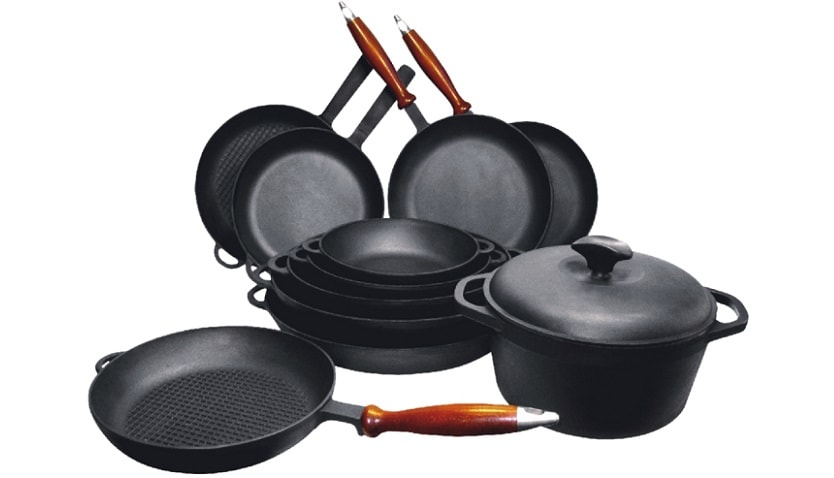
Not all metal utensils can be washed in a dishwasher, it depends on the type of material from which it is made. It is necessary to completely exclude those kitchen items that need to be washed at low temperatures using non-aggressive detergents:
- Aluminum - this metal is actively oxidized in the dishwasher. This is due to both exposure to very high temperatures and the use of alkali, which is part of detergents. If you take aluminum dishes from the dishwasher, then black spots will remain on your hands - this is aluminum oxide.
- From silver - after processing in a dishwasher, dark spots appear on their surface, the devices themselves fade, become faded. It is generally recommended to wash silver separately, avoiding contact with other metal utensils, oil and acids.
- Cast iron - the negative effect will manifest itself over time, especially when it comes to large massive pans. After the third or fourth washing, traces of corrosion will begin to appear on the surface, and the food will burn during cooking, sticking to the surface of the pan
- Copper - prolonged contact with detergents and hot water is contraindicated for it. In a rather aggressive environment, copper begins to darken, losing its characteristic warm golden hue.
- Cupronickel - due to prolonged exposure to hot water, it loses its shine, darkens, the coating begins to peel off.
![]() See also - Principles and features of loading dishes into the dishwasher
See also - Principles and features of loading dishes into the dishwasher
Wooden tableware
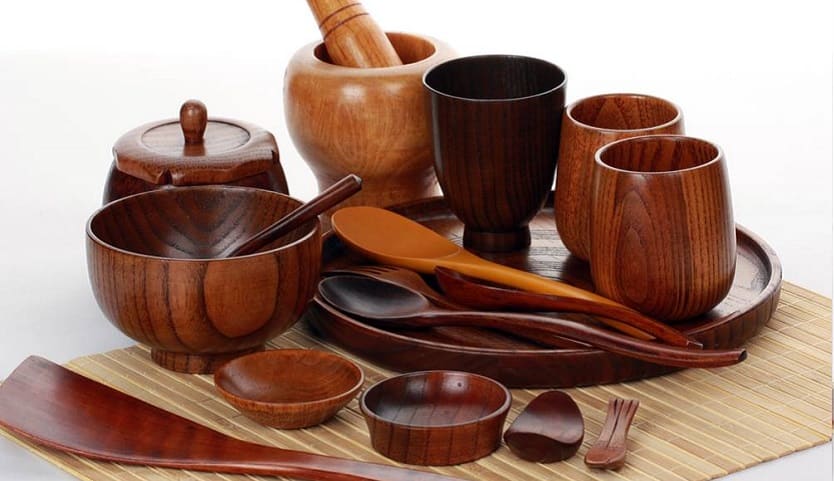
It is highly undesirable to wash kitchen utensils made of wood in the dishwasher. This is due to the structural features of the tree.With a long stay in water, the wood fibers begin to absorb moisture, the wooden product begins to swell, increasing in size. In order for wooden dishes to be saturated with moisture, even in cold water it will take about 30-40 minutes (for reference, one cycle in a dishwasher can last up to 3 hours).
In warm water, this time is significantly reduced, moisture absorption is much more intense. When drying (processing dishes with hot air), a sharp and uneven decrease in the moisture content in the fibers occurs, they begin to shrink. As a result, cracks appear on a wooden object, it deforms, loses its attractiveness and aesthetics. Therefore, in order to ensure the safety and long-term operation of kitchen utensils made of wood, it is better to rinse it with your hands in warm (not hot) water.
Important:
Also, do not wash dishes in the dishwasher that contain wooden elements, such as pans or cutting (chef's) knives with wooden handles.
Plastic dishes
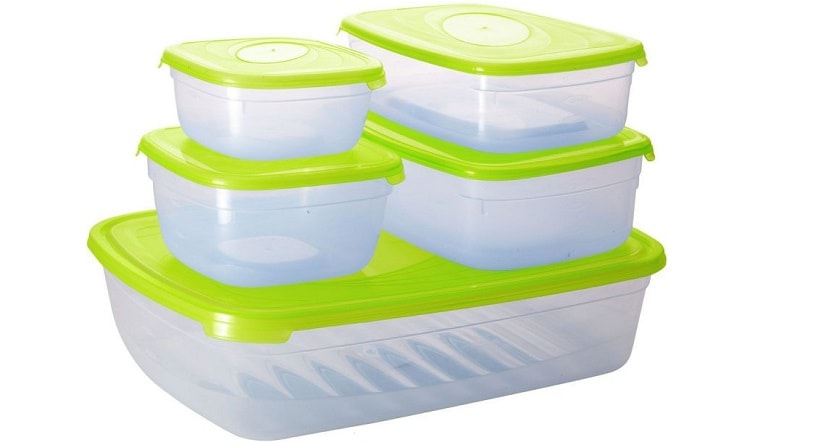
It is allowed to load into the dishwasher only those dishes that are made of special heat-resistant plastic. Usually it has a special sign indicating the possibility of automatic washing. If there is no such sign, you should not risk it and use a dishwasher to wash plastic dishes. In addition, do not put all disposable dishes, as well as plastic items on which there are glued items. Another sign that indicates the unsuitability of plastic dishes for washing in an automatic machine is a sharp characteristic "plastic" smell.
What else is not worth washing in the dishwasher
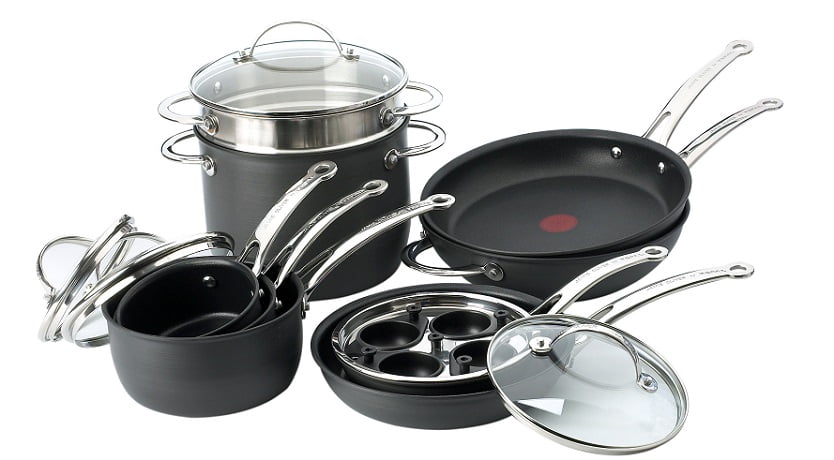
We also note which dishes cannot be washed in the dishwasher:
- gilded items are washed exclusively by hand, this will preserve their presentable appearance. The aggressive environment in the dishwasher is absolutely unsuitable for gilding; detergents will literally wash off a thin layer of precious metal. This rule also applies to porcelain cups with a gilded pattern.
- crystal - very sensitive to sudden changes in temperature, which can lead to cracking. In addition, minor vibrations can cause almost invisible scratches. Over time, when these scratches become enough, this will cause the crystal surface to become cloudy, losing its special, unique shine.
- thin porcelain - it does not tolerate sudden changes in temperature, when processing with hot steam, its surface may simply crack
- sharp knives - the knives themselves will have nothing, but they will lose their sharpening. Experience shows that even if you just hold the knife in hot water for 5-8 minutes, it will become noticeably dumber. After washing in the dishwasher, knives will have to be constantly sharpened
- Teflon-coated dishes - by themselves, they do not require much effort when washing, because when used correctly, food does not stick to the bottom of the pot or frying pan. Therefore, such dishes must be washed manually with warm water, using a minimal amount of non-aggressive detergent. In the dishwasher, due to the rather intense exposure, the Teflon coating wears out quickly, which leads to a significant reduction in the service life of such dishes
- vacuum cookware - plastic pots and containers, the lids of which allow you to evacuate air to ensure long-term storage of food. Due to the treatment with very hot water in an automatic sink, the plastic may deform slightly. And although these changes are almost invisible to the human eye, the lid will no longer fit perfectly against the walls, so the tightness of the dishes will be lost.
Washing thermoses and thermo mugs in automatic mode is allowed only if the manufacturer has indicated such a possibility. Otherwise, they must be washed with hands.
What kind of dishes can be washed in the dishwasher
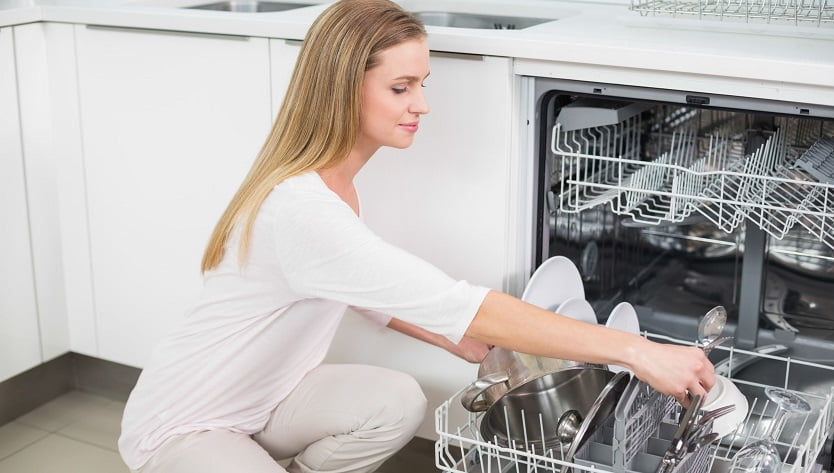
Despite a fairly large number of restrictions, the dishwasher remains a very convenient and useful household appliance, coping well with a large number of dishes of different types:
- cookware with ceramic and enamel coating
- glassware - it is important to place it correctly so that it does not break due to strong vibration, objects must be laid tightly and at a certain distance from each other
- all dishes that are made of stainless steel
- earthenware and porcelain cups and plates without patterns
- silicone molds - they can withstand the highest temperatures, great for automatic washing.
Almost all XXX food processors are suitable for automatic washing. But in order not to be mistaken and not to spoil the dishes, you must first familiarize yourself with the recommendations of the manufacturers. Now all leading companies in the operating instructions indicate as a separate paragraph whether the dishes are suitable for washing in the dishwasher. The main advice - if the manufacturer does not recommend, you should not use an automatic washing machine to wash such dishes.
Important:
More and more models with a function appear on the market, which allows washing dishes in a “gentle” mode. This significantly expands the list of kitchen items that can be washed automatically. The list of such dishes must be indicated in the instructions.

